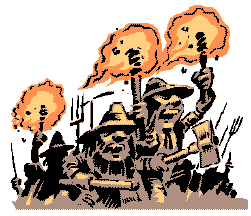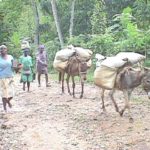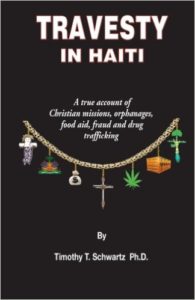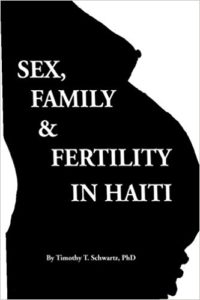The most cited explanations for the “failure” of Haitian peasants to invest in improving the land they live on– such as planting mango trees—are often the weakest explanations. And perhaps the most cited reason of all—and the most mistaken– is land insecurity, or what 30 years ago one of Haiti’s most consulted consultants, Gerald F. Murray (1985:323) called, “the whipping boy to deflect blame for [NGO] project failure.”
As the argument goes, lack of land title makes peasants fearful of improving the value of their land lest someone take it away. For Haiti, scholars have debunked the myth of peasant land insecurity over and over again (Murray 1977, 1978a, 1978b; Locher 1988; Bloch et al. 1988; McClain et al. 1988; White and Runge 1994, 1995). Haitian peasants are not insecure about their land. They’ve been buying and selling it for over two centuries, ever since they defeated the last of the Napoleon’s armies and drove off the plantation owners. In contrast to assumptions of state officials (see; CIAT 2012), and some if not most foreign aid specialists (see for example IDB 2014), they would rather not formalize ownership, at least not in a “legal” sense. To do so would draw them into a system where the title and contracts cost more than the land itself. It’s also a system they do not understand and that would expose them to depredation from unscrupulous city lawyers and urban land grabbers. The rural Haitian cultivator is more comfortable in the “informal” land tenure system where today 95% of all land transactions in Haiti occur. It’s a system complete with scrawled contracts, recognition from neighbors and even recognition from the local-level legal authorities who are physically present in the community, connected to the community through kinship, and who the peasants can hold accountable through such old fashioned and dependable mechanisms as insulting in song, shunning or, if nothing else works, burning down their house. It’s a system that the elites do not understand, something that reverses the educated city slicker vs ignorant hick syndrome that has been at the heart of land controversies throughout Western history, i.e. it gives the peasants a measure of protection.
Indeed, perhaps ironically, it’s not the Haitian peasants who are insecure about land. Those who suffer land insecurity in Haiti are predominantly the wealthy, largely absentee landowners who for 200 years have, as with the informal economy in general, watched the peasant informal land tenure system swallow their formal system. The peasantry or, perhaps more accurately, the popular class masses, have been on a steady 230-year march, first taking the land from the French colonists, then from mulatto plantations class that survived the revolution. To this day, elite Haitian land owners often watch helplessly as peasants and urban immigrants move onto the land, break it into small parcels and incorporate it into their vigorous informal trade in garden and house plots. When those elites have showed up shaking a title in hand and demanding their property back, they have, far more often than not, found themselves confronted by 100s of rock hurling and machete-wielding peasants. And they emphatically lose 90% or more of those battles. Go to a lawyer in Haiti today and complain about having lost your land to rural peasants or poor slum dwellers and the most likely advice you will get will something like the free advice a wealthy elite landowner told me he got from his own lawyer for free: “you care more about your land or your life?”
WORKS CITED
Bloch, P., V. Lambert, N. Singer, and G. Smucker. 1988. Land Tenure issues in rural Haiti: Review of the evidence. LTC Research Paper 94. Madison: Land Tenure Center, University of Wisconsin-Madison. Mimeo.
CIAT (Comité Interministériel IAT d’Aménagement du Territoire) 2012 http://ciat.gouv.ht/sites/default/files/docs/CIAT_CIATs_mission_GB.pdfIDB 2014
Locher, U. 1988. Land distribution, land tenure and land erosion in Haiti. Paper presentedat the Twelfth Annual Conference of the Society for Caribbean Studies, July 12–14, High Leigh Conference Centre, Hoddesdon, Hertfordshire, UK.
McLain, R.J., D.M. Stienbarger, and M.O. Sprumont. 1988. Land tenure and land use in southern Haiti: Case studies of the Les Anglais and Grande Ravine du Sud watersheds. LTC Research Paper 95. Madison: Land Tenure Center, University of Wisconsin- Madison. Mimeo.
Murray, Gerald 1977 The evolution of Haitian peasant land tenure: A case study in agrarian adaptation to population growth. Ph.D. dissertation, Columbia University, Department of Anthropology.
Murray, Gerald F. 1978a. Land tenure, land insecurity, and planned agricultural development amongHaitian peasants. Report for United States Agency for International Development (USAID). Port-au-Prince, Haiti: USAID. Mimeo.
Murray, Gerald F. 1978b. Hillsides units, wage labor, and rural Haitian land tenure: A proposal for theorganization of erosion control projects. Report for United States Agency for International Development (USAID). Port-au-Prince, Haiti: USAID. Mimeo.
Murray, Gerald F. 1985 Land, Trees and Tenure: Proceedings of an International Workshop on Tenure in Agroforestry. Published in 1987
White, T.A. and C.F. Runge. 1994. Common property and collective action: Lessons from cooperative watershed management in Haiti. Economic Development and Cultural Change 43(1): 1–41.








